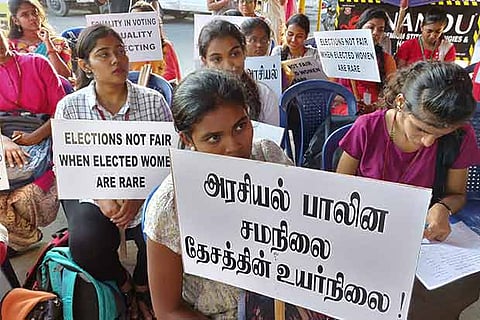

Chennai
From female infanticide, child marriage, dowry, domestic abuse, rape, sexual harassment, forced marriage, reproductive coercion, forced marriage, wage disparity to eve teasing — the list of crimes against women is a long one. Yet, the victims of such crimes are to this day only represented by a mere 61 women out of the 545 members of Parliament. Closer to home, in Tamil Nadu, only 20 women sit in the Assembly besides 212 other MLAs inspite of 50 per cent reservation for women in local bodies, facilitated by the 73rd and 74th Amendment Act of the Constitution of India passed in 1993. Assessing this climate and the lack of any agenda to address this gender gap, experienced women leaders and feminists of the day state that louder voices and consistent demands are critical to move things forward.
Tara Krishnaswamy, founder of NGO Shakti, a citizen’s collective working on political power for women, organised a gathering in Chennai and six other cities and 19 districts on Thursday to demand fair elections by balanced representation of women in the parliament. She said, “Just imagine the fate of a first-time woman voter, who stands in front of a voting ballot, only to find a list of men she can vote for? Who will she choose when not one person on that list will be capable of understanding her problems?”
About 100 women had gathered at Valluvar Kottam as a part of the NGO’s initiative to demand the Election Commission to call for all-party meets, advise and send letters to parties in favour of equal representation of women. “These gatherings are to remind parties that we women, members of the public, are watching, and asking for what is right,” said Tara.
K Balabharathi, who was a member of the 14th Assembly of TN from the Dindigul constituency, said, “The most crucial element to solving this issue is the Election Commission’s role in it. It should ensure the equal participation of women in the activities of political parties, otherwise male leaders will lead according to their whims without paying much regard to women. It should keep check on the political parties if there is due representation of women in every post.”
The ex-MLA added that besides representation, the parties coming to power should act on the assurances they give to women voters. “Also, I have to point out that, even if on a small scale, progress has been made, as initially, the women MLAs used to be controlled by their husbands or other men, but now they act on their own,” she said.
She stressed that every woman of the general public should be outspoken at the face of injustice, and that political activity is not limited to grabbing a seat in the Assembly or Parliament.
Actress Khushboo Sundar, known for her successful career trajectory, believes women have inherent leadership qualities. “Women as leaders have always contributed widely to development, they bring to the table what no man can bring, whatever field it may be. Take for instance, Mother Teresa, Margaret Thatcher, Indira Gandhi - each of their contributions in their respective areas of expertise are incomparable. Thanks to years of speaking out, so many things have changed positively for women. This should continue for more impact,” she said.
But, Vasuki, the vice-president of All India Democratic Women Association (AIDWA), believes that primarily, the parties themselves should include the objective of women empowerment in their agenda, only then even women representatives in the parties can work towards it. “Biology and ideology should co-exist, that’s the ideal scenario,” she said.
“Only a woman will know her problems, in the extension of that, only if women come to leadership roles, they will be able to provide solutions to primary issues affecting women like distribution of sanitary napkins, separate toilet facilities, etcetera,” said Suganthi, General Secretary, AIDWA. She added, “The Nirbhaya fund has not been utilised, maybe if there were equal women representatives, it would have been. In fact, I don’t even think all the MPs are aware of its existence! India is considered a superpower but how can that tag be justified without even 15 per cent of women in the centre? Only when there are 50 per cent women in Lok Sabha, it can be a true superpower.”
Visit news.dtnext.in to explore our interactive epaper!
Download the DT Next app for more exciting features!
Click here for iOS
Click here for Android